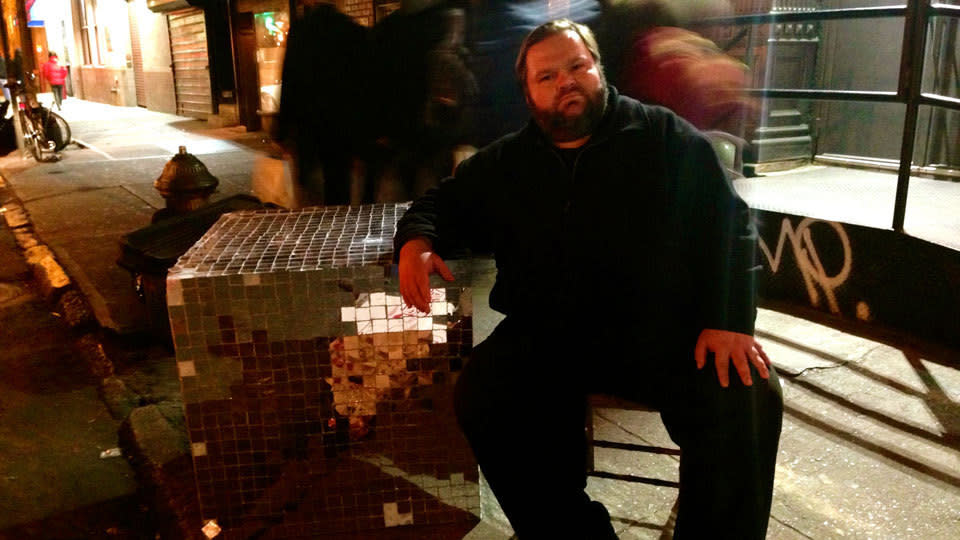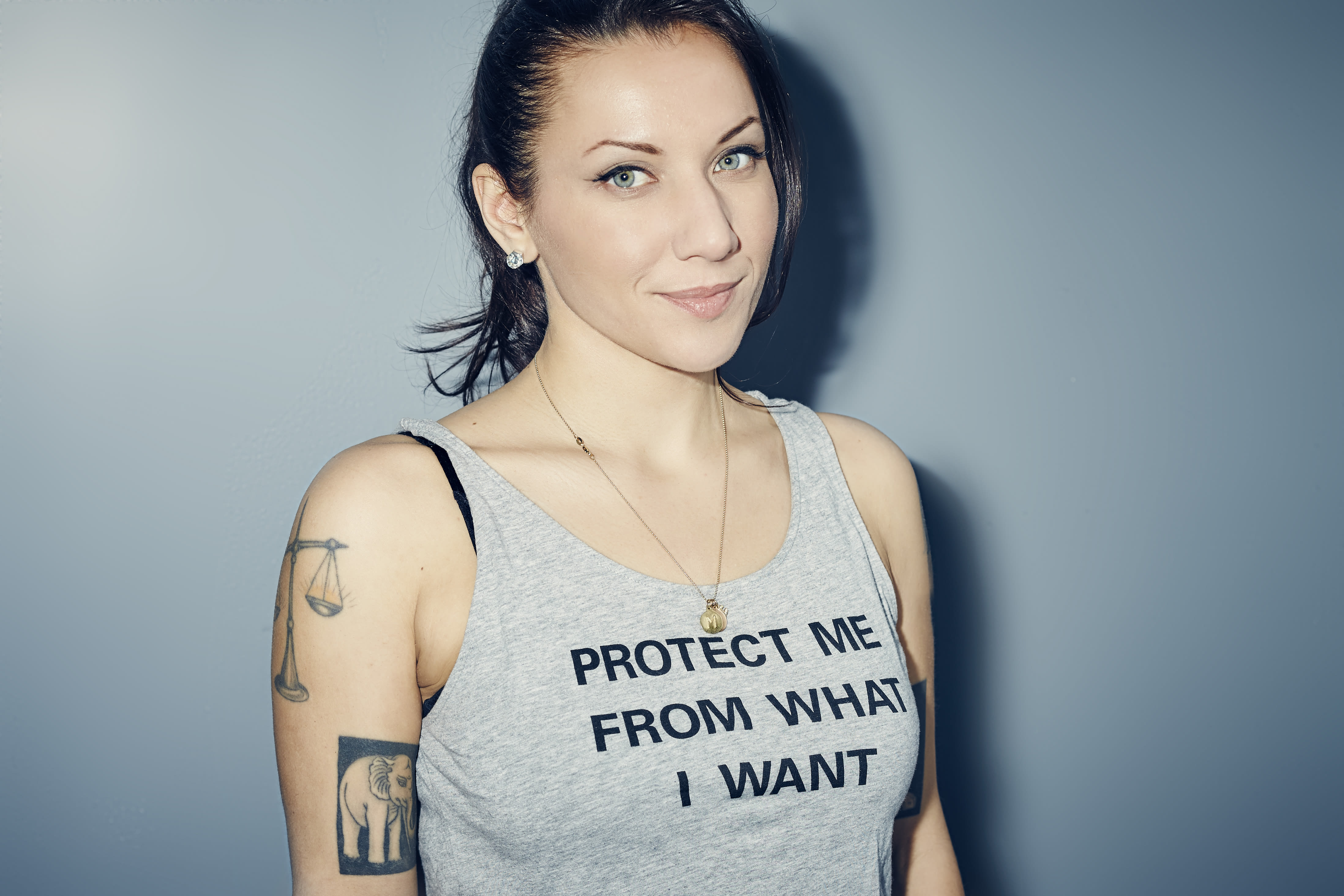Q&A: Mike Daisey on New Show, 'JOURNALISM'

Image: Ursa Waz
Since 2008, the monologist Mike Daisey has transfixed Portland audiences at PICA’s Time-Based Arts festival, most recently with The Agony and the Ecstasy Of Steve Jobs in 2010 and his 24-hour performance, All the Hours in the Day, in 2011. Then in 2012, the popular public radio program This American Life ran a radio version of The Agony and the Ecstasy, and the rest of the nation was equally spellbound by the power of his storytelling, quickly catapulting him into one of the most visible critics of the working conditions in the Chinese factories that make our ubiquitous iPhones and iPads.
But it turned out that many of the most moving parts of his story were exaggerations or outright fabrications, and This American Life spent another episode interviewing Daisey and trying to set the record straight. Many, including myself, doubted we’d ever be able to listen to Daisey with the same rapture and faith again.
Which is why I was extraordinarily surprised and more than a little conflicted when PICA sent out word that Daisey would be appearing in Portland for one night only, May 21, to do a world premiere show about, of all things, JOURNALISM (in all caps).
The press release calls it a “love letter,” although given the scorn he’s been thrown by many journalists, one might consider it a so-far unrequited one. Yet to his credit, Daisey’s certainly not run from his scandal, leaving me at least willing to listen to what he has to say about his mistakes, the place of fact and truth in storytelling, and why he wants to tackle the topic of objectivity in journalism.
To talk with Daisey is to be reminded of how masterful he is with language. Rebecca Jacobson in Willamette Week called him “a weaselly talker who spins like an iPod wheel.” For the record, Daisey considers himself more like an otter.
What is Journalism about?
This will be the very first time that I’ve performed this monologue, so I can’t be entirely certain, but I believe that what I’m going to be talking about is how we construct stories and how stories construct authority. And it’s also going to be about the changing face of journalism now. And then the third strand will be related to the myth of objective journalism that really arose out of broadcast media where stations had one voice and an anchor speaking the news.
It’s not abundantly clear in the Willamette Week article, but funny is also something very important to remember. If there’s no humor in it, there’s no opportunity to create empathy. In that case one could just listen to a very fine talk from Poynter [a media institute], and we wouldn't have to have this conversation.
You say in the press release that the diving off point is your own scandal. I feel like a lot of people caught in such a situation would flee from it and pray to the gods of cultural amnesia that it was forgotten. Instead, you’re diving into it. Why?
Because I’m very obsessed with the subject. I’m a storyteller; I tell stories for a living. I didn’t run away at all. I remained completely present and accountable throughout. I’m not leaving.
One of the most interesting moments in the This American Life episode is you pausing and saying that you don’t know if you should be saying any of this on the air. Why did you? Have you regretted that decision?
People regret things all the time at moments when you get tired and exhausted. But I haven’t regretted the fundamental choice. One of the things that journalism does that’s interesting: because you don’t see the frame, you assume the frame does not exist. For instance, Ira does not have subpoena powers. I chose to willingly go in and answer those questions on tape, and I chose to give him the editing rights to edit them however he saw fit.
It’s been very hard, but I don’t think I would’ve had it another way. I don't think there's another path for me personally that I would've been able to live with.
How did it change your life as an artist and performer?
It created a charged environment in which people questioned what I said and wondered about the veracity of the things I said in a pointed manner. Which is to say, it made people listen to me in the way they should be listing to their news.
Fundamentally, it's actually better and more interesting to be a monologist where people have woken up to the idea that everyone telling you a story has an agenda. It's much more interesting to use that voice than to co-op the voice of nonfiction—the pale voice that I’m telling the truth and you should trust me because here are the cultural signifiers that you must. It's more interesting to not have that armor.
But of course just because it's more interesting doesn't mean it's not harder. It's been a challenging year in many ways, but I'm a much better artist now than I was before.
Have you changed your performance style to be more transparent about where your information comes from?
It’s changed a little. Honestly it didn't change very much at all. One of the things that came out of everything is I decided to create a colophon, which I run in every program for the shows I do. A colophon technically is the name for the page in the book that tells you what font the book was laid out in, the origins of the font.
My colophons tell you the general idea of where the ingredients that went into the monologue came from. The tone of the colophon gives you the provenance of what’s been built, but they do not give you a recipe.
At the end of the day, I’m not a journalist. I’m an artist in the American theater, and so my job is very similar to being a magician. It's an interesting balancing act because it's part of my job that I'm creating illusions, and they’re illusions intended to tell the truth—to tell the truth of human situations, to create empathy between us and other people.
If my work could work the way that traditional journalism does, I would footnote everything, but that wouldn’t function in the same way because it would actually dissolve the underpinnings of how the theater is constructed in the room. So what I'm trying to do is to find a path where the colophon serves to give sign and sigil of the intent and the framing without undermining the pieces.
You tell Ira in that episode that truth is different for theater and journalism. Which he didn't buy at all, particularly in the case of something like the hexane (a part of the story where Daisey inserts a chemical poisoning that happened in another city into his story). Have your thoughts changed on this matter?
I want to be clear about something here. I’m not sure what’s in that episode. While I've read the transcript, I'm not infinitely aware of what's in the episode because I think it’s important to remember that that’s a 14 minute edit of a three to four hour conversation that was edited by someone else. I know we talked about a great number of things. I find that the things that remain were the things that I found the most tired and beaten down. I don't remember seeing sections where I was fiery or making points strongly. So I'm not sure which point we talked about that you're referencing in the tape that he chose to use.
Seriously, you haven’t listened to it?
No.
That's interesting, particularly given you’re doing a show about journalism.
I’ve read the transcript many times.
So you know what it's talking about then.
I have my memories of the entire four-hour conversation, and then there are the parts that he's chosen to excerpt. So I'm trying to remember which they are.
So back to the hexane point then, where you say this is something that happened to you, when it was actually something you'd read about. And you felt like that was something that was true for the theater but the mistake was to put it in the journalism context.
This sounds like something that I said in the edit. Within a week of everything happening, I made a full apology publicly.
What I'm asking is: when you move forward with journalism and storytelling, would you still pull something like that into a story? Or how has that experience change the way you're going to craft your stories moving forward?
It's definitely affected it deeply because I have to think about how people will view them. Fundamentally, I also have the job of surprising and delighting people. I need to be mindful of people's expectations and to not make them feel robbed or cheated, but at the same time it’s antithetical to my job to announce a code and then swear only to tell stories in a certain manner.
I made the decision to create a framing device in the program for people who are most concerned in the provenance of what they see, but what I’m intensely not interested in is straight jacketing myself by making a declaration about what kind of stories I’m going to make.
That was a lot of what my fight with Ira was about. It’s not very clear from what’s left in the exchange. But a lot of it was his determination that I should declare infinitively that all my work is always fiction, which is what he wanted more than anything.
So like in your current show American Utopias, the colophon says: “The management also wishes to remind you that this is a true story, and like every story being told in every medium, all stories are fiction.”
"All stories are stories” is what it really should say. But that wouldn’t mean anything in our age today. People who tell non-fiction stories are very interested in the power of those words remaining sacrosanct, and the words “non-fiction,” meaning not fake, for that to remain true. So it's very important that anyone telling any other stories—fiction—be as fake as possible, so the not fake stories become more true. So it's very important that your cultural authority is built that way. I assume that's why he was so insistent and that was the main point of our many-hour conversation.
When you declare something fiction, it often drains it of power. It's very doubtful that Upton Sinclair’s The Jungle, were it published today and acknowledged as fiction, it's very doubtful that that book would've gotten any traction or lead to any changes. Because as soon as it's fiction, it is fake.
This American life has undoubtedly published a great deal of memoir, like David Sedaris, that's laced with fiction. Is it the fact that your stories have the intention of inspiring political change?
Let's call a spade a spade. Yes. It has a lot to do with the specificity of it. If it was not about Apple, there wouldn't have been a problem in the least.
It isn't a journalism conceit. The brutal conditions are across the Special Economic Zone. Other places' violations are even more terrible than the ones that Apple has been caught with. The stories that come out of Samsung are even worse.
But my objective isn't journalism, so I wasn’t there to gather the very worst stories. Nor was my objective to be there as a reporter or a witness, in which case I would've been very careful to only report things I saw myself. My job was to be a monologist and to create a poetic synthesis of the things that I have read over 10 years, combined with my own experience of being on the ground and knowing what it feels like to be in that environment, and to synthesize those things together. That’s my job.
Where I fell short was not navigating well the transition point between the inside the theater and what the story does to people in the theater in terms of moving hearts and minds, and what happens when I allow my work to be used by other mediums, which I'm totally complicit in, and that's why I apologized.
And yet you didn't raise any of these points about this being a synthesis while working with This American Life on the fact checking.
I was clear with Ira that my interpreter was a composite and talked about this in the Georgetown speech I gave days afterward.
You did a show about James Frey, right? And we’ve had a slew of scandals involving fabricating truths since him, the most recent being Jonah Lehrer. Are there more people bending and embellishing the truth now, or is it just a matter that more are getting caught?
I don’t particularly care very much. I think these people who violate the rules and then everyone gets upset about it is great coverage for built in systemic systems that we don't examine.
I love that we can spill gallons and gallons of ink about the terrible fact that James Frey’s memoir was not as real as everyone wishes it was. But the fact that we have no labor reporting in this country—there was a great Pew poll from 2008 to 2011 that the percentage of broadcast journalism covering labor was .3 percent. There are whole channels dedicated to business, you could call them management programs, and then the amount of journalism is one-third of one percent covering labor. The idea that this is an objective playing field is laughable. It’s not. It never was. To me, those things are more important and more interesting.
It’s much easier to attach blame or indignation or wrath to the individual, also heroism and bravery, because we have a human bias towards the human. We like to give qualities to humans, but we live in a corporate age. The greatest violations of human spirit come from things that are not even human, so we don't blame them proportionately for the things that happened. We’ve accepted it as the way of the world. To me that's more interesting and always has been.
Mike Daisey's JOURNALISM
Tiffany Center Emerald Ballroom
Tuesday, May 21What do you feel about your experience puts you into a position to be talking about this topic? Why do you feel like people should care after they been filled with so much doubt about your veracity?
Although very nicely put, this is another version of “what are your credentials?” I don’t have any. I’m an unregulated monologist. I never get this question from anyone but journalists.
I've never claimed to have any credentials other than being an incredibly good storyteller. If people are like, "I don’t want to hear him talking about journalism," there is a fantastic system they can use to exercise that, and that would be not to come. On the other hand, if they want to see a very interesting, provocative evening that I hope will give them something to chew on and really grapple with, then they know where to find me.




